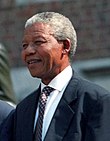South African general election, 1994
|
|
|||||||||||||||||||||||||||||||||||||||
|
|||||||||||||||||||||||||||||||||||||||
|
|||||||||||||||||||||||||||||||||||||||
|
|
|||||||||||||||||||||||||||||||||||||||
| National Assembly after the election | |||||||||||||||||||||||||||||||||||||||
|
|||||||||||||||||||||||||||||||||||||||
Nelson Mandela
African National Congress
General elections were held in South Africa on 27 April 1994. The elections were the first in which citizens of all races were allowed to take part, and were therefore also the first held with universal adult suffrage. The election was conducted under the direction of the Independent Electoral Commission (IEC), and marked the culmination of the four-year process that ended apartheid.
Millions queued in lines over a three-day voting period. Altogether 19,726,579 votes were counted and 193,081 were rejected as invalid. As widely expected, the African National Congress (ANC), whose slate incorporated the labour confederation COSATU and the South African Communist Party, won a sweeping victory, taking 62 percent of the vote, just short of the two-thirds majority required to unilaterally amend the Interim Constitution. As required by that document, the ANC formed a Government of National Unity with the National Party and the Inkatha Freedom Party, the two other parties that won more than 20 seats in the National Assembly. The new National Assembly's first act was to elect Nelson Mandela as President, making him the country's first black chief executive.
...
Wikipedia




